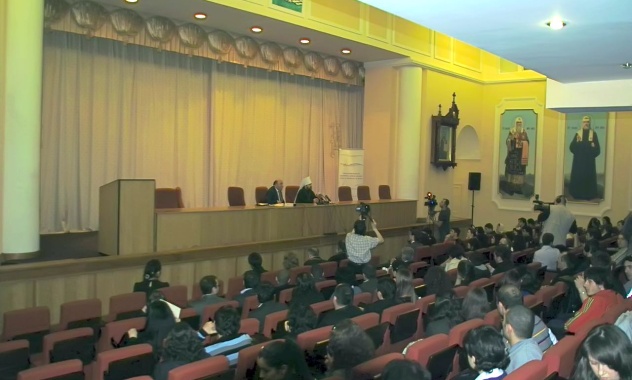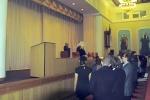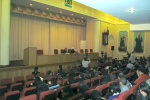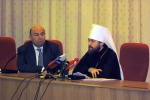Metropolitan Hilarion meets Orthodox youth from the Caucasus with the blessing of His Holiness Patriarch Kirill
On 20 April 2010, Metropolitan Hilarion of Volokolamsk, Chairman of the Moscow Patriarchate’s Department for External Church Relations, met with the Orthodox youth from the Caucasus at the “Danilovsky” hotel complex in Moscow with the blessing of His Holiness Patriarch Kirill of Moscow and All Russia. Taking part in the meeting were the Georgians, the Ossetians, the Abkhazians, the Adygeis, the Kurds, and Greeks, who reside or stay in Russia. Representatives of the Armenian diaspora and Muslim youth from several regions of the Caucasus were among the guests. The meeting was organized with the participation of the Moscow Patriarchate’s Department for External Church Relations.
Metropolitan Hilarion of Volokolamsk, Chairman of the Moscow Patriarchate’s Department for External Church Relations addressed the audience:
“Dear brother and sisters! Christ is risen!
“First of all I would like to thank all of you for coming to this meeting as I know that it was rather difficult to convene you here. Representatives of different nationalities and ethnic groups are present in this hall, including the Georgians, the Greeks, the Armenians, the Ossetians, the Abkhazians, the Russians, and representatives of other nationalities, the Kurds among them.
“The convening of this assembly should not surprise us, as the Church unites people irrespective of their ethnicity. St. Paul said that “there is no longer Greek and Jew… barbarian, Scythian.., but Christ is all and in all!” (Col. 3:11) in the Church of Christ.
“The Church is a reality that helps to overcome all national conflicts. People who are at enmity in everyday situations in the secular world can meet in the Church and bring peace to one another. The task of the Church throughout centuries has been to reconcile people. The Church does not show a preference for one nation; she will never say that the Russians are better than the Georgians, or the Ossetians are better than the Kurds, as all people are equal for Christ and should be equal for the Church, as she is a spiritual mother for people of different nationalities, different social status and different ages.
“It is not fortuitous that there is a place in the Church for an infant whom we baptize and bring to church to receive Holy Communion, for schoolchildren who come to church to learn the fundamentals of the faith, for the youths who come to church being attracted by God’s grace, and for adults and the elderly. Our life from birth to death is linked with the Church: she meets people when they come to this world, takes them into her bosom through the Sacrament of Baptism, and sees them off to the other world so that in future they could remain the members of the one Body of Christ.
“The Church is a reality that unites us above all differences. There is no difference among priests and those who are not priests. There are differences in their function and ministry, but not in their value. One cannot say that one priest is more important than the other, or that a metropolitan is dearer to God than a simple believer, a reader, an altar boy, or a nun in the convent.
“God loves all people, and it is impossible to say that He loves this man more or less than the others. A great saint, Isaac of Syria whose works I have studied for several years, said that God had no such categories as more or less, better or worse. God loves all people, be they righteous men or sinners. One cannot say that if we behave ourselves, God will love us more, and if we sin, He will love us less. God loves us always, irrespective of our love to Him or lack of love. God is always close to us, irrespective of our closeness to Him. God is always near, even if we are far from Him.
“It is impossible to go away from God, as He is omnipresent. His presence is a source of joy and inspiration for the one, and a source of sorrow and suffering for the other. It depends on a person’s attitude to good and evil. If a man chooses good when it is necessary to choose between good and evil at a concrete moment of his life, then God’s presence does not bring him a discomfort, and the commandments of God do not seem too difficult to fulfil. However, if a man consciously chooses evil and does not want to build his life according to moral values, which the Lord has commanded us to follow, then the presence of God brings him discomfort and even suffering.
“Certain people refuse to believe in God, as they feel more comfortable to think that there is no God in order to do bad things, rather than to think that there is God and be afraid of punishment for sins. There are people who believe in God but do evil things. This would seem to be an impossible situation from the point of view of God’s right judgment, but we see this situation regularly in our earthly reality.
“We know that God is patient. He endures human sins, the sins of all of us. He expects our repentance and our conversion to Him. Often enough, when we deserve punishment, He does not punish us, and even if He punishes us, it is not out of revenge, but for teaching us so that through sorrows or trials we could come to the knowledge of God.
“You are young people and, as His Holiness Patriarch Kirill of Moscow and All Russia, with whose blessing I am meeting with your today, would say that looking at many young people, we see the future countenance of the Orthodox Church. The future of the Church depends on you, rather than on the people of the older generation who have already fulfilled their sacred mission. During hard years of persecution they passed their faith to the people of a middle generation, to which I belong, and to the youth, to which the majority of you belongs. They have passed this faith to us, and our task is to pass it to our children and grandchildren. For this we should live by faith.
“Today many people call themselves Orthodox. However, not all of them know what the Orthodox Church is and why people need her. Often enough, Orthodoxy for these people is reduced to the keeping of certain cultural traditions. They paint Easter eggs, bake Easter cakes, perform certain rites and, at best, they baptize their children, and hold burial services for their relatives. However, the Church is a reality that can accompany people throughout their lives. This is a kind of special dimension in human life.
“This can be compared with the two-dimensional and three-dimensional space. Life without the Church is a life in the two-dimensional space, while life in the Church gives a new dimension and a special opportunity to get to the bottom of events. Many events in human life, which seem fortuitous or absurd from a human point of view, are meaningful for a believer. The Lord reveals to a believer the meaning of the events happening in his life.
“Often enough a man leads a life, in which his will does not agree with the will of God. A man wants to order his life by his own will and thinks that it would be better. The Lord by His mysterious and gracious ways teaches this man His will. The Lord, like a thoughtful and attentive teacher, takes our hand and leads us, and often enough we comprehend the meaning of the events of our life later, when the Lord reveals their meaning to us.
“A man lacking the faith is like a blind man who walks with a cane or leaning on the arm of another man, finding his way blindly. People who do not believe in God and stay far from the Church do not know the meaning of their life. They can have everything: wealth, money, glory, but no happiness. Why so? It is because they do not know the meaning of life. People who do not understand why and for what they live and often feel themselves full of sufferings and even commit suicide are those who have everything by earthly standards, but lack the most important thing in life – happiness. They lack the inner spiritual fullness or understanding of why and for what they live. The Church gives people this fullness and the meaning of life. The Church shows people that all their deeds can be not simply human doings or a means to earn money, but the ministry to God and people.
“If we fulfil our professional, family and human duties and remember that we have been called to serve God and people, our life gets ‘the third dimension,” which unbelievers lack. Everything will make sense; everything will form a circle and will be justified from on high, and we shall not vegetate any longer on the earth, living day by day, year by year, expecting the old age to steal up to us, but we shall live being aware of the purpose of our life, and every day of it will be meaningful.
“Orthodoxy unites almost all those present here. Orthodoxy is a spiritual tradition of both Russia and many Caucasian people. We know that Iberia, as a church legend holds, is a garden of the Most Holy Mother of God. We know that the entire Caucasus is an ancient land of the apostolic preaching. According to certain data, St. Matthew is buried near Batumi, and the relics of St. Simeon Canaanite are resting under a bushel in Abkhazia. St. John Chrysostom has found his last shelter on this land, and believers venerate this place. Ss. Bartholomew and Thaddaeus are considered to be founders of the Armenian Church.
“Christianity in the Caucasus is deeply rooted. The Caucasus was enlightened by the light of the faith of Christ in the 4th century. During centuries the Orthodox believers in the Caucasus have suffered from invasions, but the Orthodox faith in the Caucasus has not perished, but has remained the basis and a ferment that has shaped the spiritual and cultural identity of the Caucasian people for centuries, The Orthodox Church has always served to peacemaking, and today she continues to serve this noble cause. Unfortunately, conflicts spring up among people from time to time mostly there where is a certain difference of opinions, views, skin and hair colour, or language. The Church can reconcile people who cannot be reconciled by human standards. There have been many cases in the history of Christianity in the Caucasus when the Church could extinguish interethnic conflicts by playing her peacemaking part. When the Soviet Union collapsed in the 1990s and many hotbeds of tension flared up in the post-Soviet space, the Russian Orthodox Church in cooperation with the Georgian Orthodox Church, and the Armenian Apostolic Church took steps towards reconciliation of people with an active participation of the Caucasian Muslims. His Holiness Patriarch Alexy II had several meetings with the Armenian Catholicos, the Georgian Patriarch, and with the spiritual leader of the Caucasian Muslims Allahshukur Pasha-zade. His Holiness Patriarch Kirill continues to hold such meetings. The next meeting, the interreligious summit is due to take place in Baku in several days.
“Today many young people from the Caucasus live and work in Russia. The territory of historic Russia has become a home for many representatives of the Caucasian nations, including the Georgians, the Armenians, the Azebaijani, the Ossetians, and others. There are political borders in the post-Soviet space today, but the Church transcends political borders, and we in the Church should forget about them. My experience as one of a man who travels much regularly visiting different countries, the Orthodox countries in particular, tells me that political, cultural, and language barriers are easy to overcome, if there is a good will to do it. It seems to me that for you, the young people, united by the Orthodox faith, the task of building bridges between representatives of different nations is a sacred task which all of you should do as far as possible.
“People could not live in the state of permanent conflict. People seek peace by their nature, and any conflict by its nature is a temporary and transient state. Even if a conflict lasts many years, it will come to its end sooner or later. It depends on all of us how soon the present interethnic conflict will be overcome.
“Christ has taught us to love not only our friends, but enemies, too. There was a great Russian saint, Silouan of Athos, who lived in the 20th century and whose contemporaries lived on this earth quite recently, with one of whom, Father Sofrony, I happened to be acquainted. St. Silouan said that the main criterion, by which one can see whether you are a Christian, is your love or lack of love of your enemies, because it is easy to love one’s neighbours. We love our relatives, our friends, our colleagues, and representatives of our nation; we love those who are near and dear to us and share our cultural traditions. It is much more difficult to love “other” people: representatives of other nations, people of different colour of skin, people who speak other languages. It is even more difficult to love people who found themselves on the other side of the barricade because of historical or political situation, people who know that their fathers and grandfathers could shed blood of the representatives of our nation. This historical memory exists and is passed from century to century.
‘There is no other power except the Church that can overcome these differences. There is no other power except the Divine grace that can bring peace and reconciliation into human hearts. I would like to call you, dear brothers and sisters, to work for the reconciliation of those who are at enmity at present, as in the long run not only our destiny and the destiny of our descendants depend on all of us, but also the destiny of our countries, our regions, and our nations.”
The DECR Chairman answered questions, including those of the meaning of certain Gospel assertions, the relationship between the Russian and Georgian Orthodox Churches, and the level of relations between the Church and the state at present. Answering the question whether one can address God with one’s own words, the DECR Chairman remarked that one can do it even silently, but should know certain prayers, for instance ‘Our father…” by heart, and said it in the Georgian language.
Metropolitan Hilarion was presented with the Iberian Icon of the Mother of Good and a rosary of the Holy Mount Athos as a token of the meeting.












